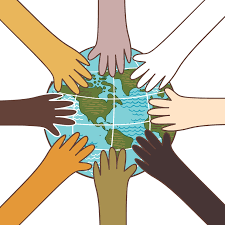We use cookies on this site to enhance your experience.
By selecting “Accept” and continuing to use this website, you consent to the use of cookies.

During our semester in Multiculturalism, we were able to learn a lot, not only about the idea of multiculturalism as a whole, but about each other’s cultural practices, and how even though we all come from different cultural backgrounds, there are certain ties that bind us. We were also able to recognize where Canadian society falls flat on their multiculturalism policies, and what we can do as individuals and society as a whole to uphold this important Canadian policy.
Our first Laurier International Cultural Conversation focused on the topic of what our similarities and differences are, and the four of us used this conversation to be able to get to know each other. While most of us were second year students or higher, this was still one of our first experiences communicating with classmates in this way, as last year we were required to complete studies remotely due to the covid-19 pandemic. We all came from different cultural backgrounds, yet had similar experiences growing up.
While we won’t get into the differences that we found in each other, we will say that these differences gave each of us a unique perspective for each of our following conversations. We tackled many different topics including white supremacy, cross-cultural communication, the iceberg model of culture, and many more. The more we had these tough conversations, the easier it became. We recognized each person’s cultural differences, learned how they approached topics and created a safe space where we could both learn each person’s views and help each other grow a new and improved perspective. Listening to each other’s points of view and perspectives on each situation allowed us to expand on our conversations and enhance our learning through these conversations, rather than your standard classroom setting.
The more we had these conversations, the more we had what we’ll call “aha moments” where we realized that while Canada has a national policy of multiculturalism, many Canadians (as individuals, institutions, interest groups, etc.) aren’t as inclusive and don’t practice this policy as they should. Yes, things may be better than they have in the past, but there is still a long way to go to create a true multicultural society.
At first, this saddened us as we didn’t think there was much that we could do. We had the usual “well I am only one person; how can I make a difference?” feeling and we decided to talk this out as a group. Once we took some time to reflect, we realized that there are tons of things we could do to improve on multiculturalism, even just in our small communities.
We discussed specific issues that we felt could be improved by introducing multiculturalism practices and were able to dive deeper into the conversations than we ever thought we could! Another important thing that we discussed is that we are not the only people that feel the same way we do. Other people are just as aware of the lack of multiculturalism in our society and are working hard to spark changes. Just having these conversations helps other people become aware of what’s really going on and helps inspire them to make a difference.
When we started having these conversations, we didn’t know what we would get out of them; we all felt like we knew everything we needed to know about the topic of multiculturalism. By getting to dip deeper into these topics and have a safe space to discuss them, we all not only became closer, but learned more on the topic than we could have imagined. By learning from one another, we were also able to improve ourselves as individuals, and think more into the future and how we need to be more open-minded about those from different cultural backgrounds.
When choosing a picture to symbolize our piece, we wanted to touch on the fact that we feel we need to bring everyone together globally in order to create a true multicultural society. The picture we agreed on, hands gathered around the globe, symbolizes different cultures coming together to support one another wherever they are in the world.
HR261 has been a unique experience for each of us, as we have never taken a class like this. We can only hope that more courses at Laurier ask for as much student run discussions as Multiculturalism did!
Alyssa Scholes-Zimmerman, Human Rights & Human Diversity, Brantford
Claire Smith, Human Rights & Human Diversity, Brantford
Kristi-Lynn Brown, Human Rights & Human Diversity, Brantford
Fatima Patel, International Student Collaborator, Community Health, Brantford